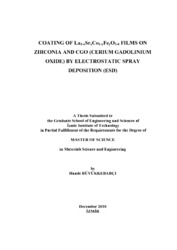Please use this identifier to cite or link to this item:
https://hdl.handle.net/11147/3066Full metadata record
| DC Field | Value | Language |
|---|---|---|
| dc.contributor.advisor | Akkurt, Sedat | - |
| dc.contributor.author | Büyükkebabçı, Hande | - |
| dc.date.accessioned | 2014-07-22T13:50:49Z | - |
| dc.date.available | 2014-07-22T13:50:49Z | - |
| dc.date.issued | 2010 | - |
| dc.identifier.uri | http://hdl.handle.net/11147/3066 | - |
| dc.description | Thesis (Master)--Izmir Institute of Technology, Materials Science and Engineering, Izmir, 2010 | en_US |
| dc.description | Includes bibliographical references (leaves: 55-58) | en_US |
| dc.description | Text in English; Abstract: Turkish and English | en_US |
| dc.description | xi, 58 leaves | en_US |
| dc.description.abstract | In this study preparation and characterization of coating of La0.6Sr0.4Co0.8Fe0.2O3-δ and La0.6Sr0.4Co0.2Fe0.8O3-δ materials on TZ-3Y (3 mol % doped yttria) and CGO (Ce0.9Gd0.1Oxide) ceramic electrolytes was studied. Electrostatic spray deposition (ESD) was used for depositing the coatings on ceramic electrolytes to develop a well bonded electrolyte-cathode material for potential IT-SOFCs (intermediate temperature solid oxide fuel cells) applications. Precursor solutions having La0.6Sr0.4Co0.8Fe0.2O3-δ or La0.6Sr0.4Co0.2Fe0.8O3-δ stoichiometry were prepared from various salts before being sprayed on a heated ceramic substrate which rapidly evaporated the solvent in the salts and the droplets struck and covered its surface. A high voltage was maintained to accelerate the droplets to high speeds. A coating with a minimal 1 µm of thickness was successfully produced. Effects of experimental parameters like the flow rate of the solution (0.3-1.5 ml/h), distance between the nozzle and substrate (15-45 mm), temperature of the substrate (250-375 °C), post heat treatment temperature (900-1300 °C) of the coated substrate and applied voltage on the quality of the coating were studied. Analytical tools like DTA/TGA, Scanning Electron Microscopy (SEM) and Xray Diffraction (XRD) were used to investigate the samples to check for the quality of the coating. Coating microstructures ranged from dense to porous depending on the deposition parameters. Sample with 30 mm distance and 0.7 ml/h of flow rate produced the best reticulated structure of the coating. No preferential landing effect was observed on any of the samples studied. Zirconia was not an effective substrate for formation of La0.6Sr0.4Co0.8Fe0.2O3-δ or La0.6Sr0.4Co0.2Fe0.8O3-δ. Cerium gadolinium oxide, however, was effective for La0.6Sr0.4Co0.8Fe0.2O3-δ but not for La0.6Sr0.4Co0.2Fe0.8O3-δ. | en_US |
| dc.language.iso | en | en_US |
| dc.publisher | Izmir Institute of Technology | en_US |
| dc.rights | info:eu-repo/semantics/openAccess | en_US |
| dc.subject.lcsh | Coatings | en |
| dc.subject.lcsh | Electrohydrodynamic | en |
| dc.subject.lcsh | Zirconium oxide | en |
| dc.subject.lcsh | Cerium oxide | en |
| dc.subject.lcsh | Godolinum | en |
| dc.subject.lcsh | Cathodes | en |
| dc.title | Coating of La1-Xsrxco1 Films on Zirconia and Cgo (cerium Gadolinium Oxide) by Electrostatic Spray Deposition (esd) | en_US |
| dc.type | Master Thesis | en_US |
| dc.institutionauthor | Büyükkebabçı, Hande | - |
| dc.department | Thesis (Master)--İzmir Institute of Technology, Materials Science and Engineering | en_US |
| dc.relation.publicationcategory | Tez | en_US |
| dc.identifier.wosquality | N/A | - |
| dc.identifier.scopusquality | N/A | - |
| item.openairetype | Master Thesis | - |
| item.cerifentitytype | Publications | - |
| item.grantfulltext | open | - |
| item.fulltext | With Fulltext | - |
| item.openairecristype | http://purl.org/coar/resource_type/c_18cf | - |
| item.languageiso639-1 | en | - |
| Appears in Collections: | Master Degree / Yüksek Lisans Tezleri | |
Files in This Item:
| File | Description | Size | Format | |
|---|---|---|---|---|
| T000878.pdf | MasterThesis | 7.1 MB | Adobe PDF |  View/Open |
CORE Recommender
Page view(s)
286
checked on Apr 7, 2025
Download(s)
74
checked on Apr 7, 2025
Google ScholarTM
Check
Items in GCRIS Repository are protected by copyright, with all rights reserved, unless otherwise indicated.